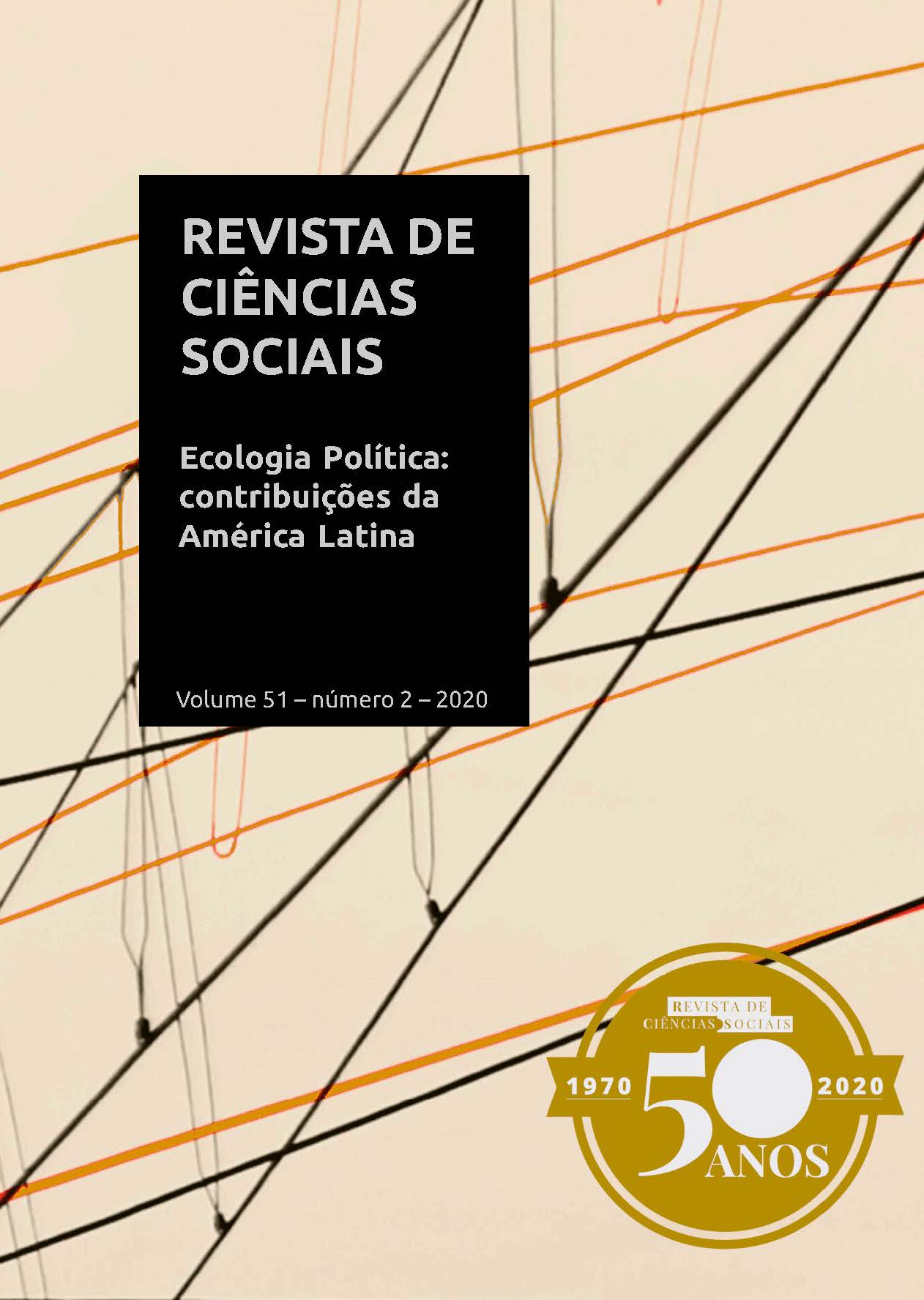Human ecology and urban sociability
Sociological approaches
DOI:
https://doi.org/10.36517/rcs.2020.2.a01Keywords:
Chicago school, Human ecology, Urban sociability, Sociological theoryAbstract
Considered one of the founders of urban sociology, the so-called Sociological School of Chicago was responsible for an important elaboration of theoretical synthesis in the modern sociological field, finding relevant points of contact between the theories of Georg Simmel and Ferdinand Tönnies, to mention two "canons" not much referenced these days. Taking the city (or the "urban phenomenon") as its unit of analysis par excellence, it promoted, side by side an original theoretical perspective, a vigorous research agenda and refined empirical approach to urban social phenomena, including opening the way to development of other sociological perspectives. The purpose of this article is to give a brief account of the repertoire and conceptual grammar elaborated in his formative period, especially through the pioneering figures of Robert Park, Roderick McKenzie and Ernest Burgess. I believe that the theoretical movement / research program known as Human Ecology was the first to seek a solution, strongly anchored in an empirical approach, to understand the possible correlations between certain socio-spatial configurations and behavioral dispositions of individuals in modern urban societies, contributing to emergence and consolidation of the notion of urban sociability.
References
ANDERSON, Nels. On hobos and homelessness. Chicago: University of Chicago, 1998.
BULMER, Martin. The Chicago School of Sociology: Institutionalization, Diversity and the Rise of Sociological Theory. Chicago: University Chicago Press, 1984.
BECKER, Howard. “A escola de chicago”. Mana, Vol.2 n.2, Museu Nacional, Rio de Janeiro, outubro de 1996.
BURGESS, Ernest. “The growth of city: an introduction to a research project”. In: PARK & BURGESS. The city. Chicago/London: University of Chicago Press, 1925.
BRANCALEONE, Cassio. “Considerações sobre a sociabilidade do homem urbano. Uma (re)leitura de George Simmel”. Teoria & Sociedade (UFMG), v. 15, Belo Horizonte, 2007.
______________. Teoria social, democracia e autonomia. Rio de Janeiro: Azougue, 2015.
CASTELLS, Manuel. A questão urbana. Rio de Janeiro: Paz e Terra, 2000.
COOLEY, Charles. Social organization. Glencoe: Free Press, 1956.
_____________. Human nature and the social order. New York: Schocken Books, 1964.
COULON, Alain. A escola de Chicago. Campinas: Papirus, 1993.
DURKHEIM, Emile. As Regras do método sociológico. 10ªed. São Paulo. Nacional, 1982.
DELLE DONNE. Marcella. Teorias sobre a cidade. Lisboa: Edições 70, 1980.
ELIAS, Norbert. O processo civilizador. Vol. I. Rio de Janeiro: Zahar, 1993.
EUFRASIO, Mário. Estrutura urbana e ecologia humana. São Paulo: Ed. 34, 1999.
FRUGOLI Jr., Heitor. Sociabilidade urbana. Rio de Janeiro: Zahar, 2007.
GEERTZ, Clifford. A interpretação das culturas. Rio de Janeiro. Zahar, 1978.
GOTTDIENER, Mark. A produção social do espaço urbano. 2ªed. São Paulo: Edusp, 1997.
GRAFMEYER, Yves & JOSEPH, Issac (orgs). L´Ecole de Chicago: Naissance de l’Écologie Urbain. Paris: Champ Urbain-Aubier, 1979.
JOSEPH, Issac. “Entrevista sobre a escola de Chicado”. BIB, n.49. ANPOCS. Rio de Janeiro, 1o semestre de 2000.
KURTZ, Lester R. Evaluating Chicago Sociology: A Guide to the Literature with an Annoted Bibliography. Chicago: University Chicago Press, 1984.
LEFEBVRE, Henri. A revolução urbana. Belo Horizonte: UFMG, 1999.
McKENZIE, Roderick. “The ecological approach to the study of the human ecology”. In: On human ecology. Chicago/London: University of Chicago Press, 1968.
__________________. “The neighborhood: a study of local life in the city of Columbus, Ohio”. In: On human ecology. Chicago/London: University of Chicago Press, 1968.
PARK, Robert & BURGESS, Ernest. 1970. Introduction to the science of sociology. 2ªed. Chicago. University of Chicago Press.
_________________. Human Communities: the city and human ecology. Vol II, New York/London: The Free Press/Collier Macmillan, 1952.
_________________. “A cidade: sugestões para a investigação do comportamento humano no meio ambiente urbano”. In: VELHO, Otávio (org). O fenômeno urbano. 3ªed. Rio de Janeiro: Zahar, 1976.
PIERSON, Donald (org.) Estudos de ecologia humana: leituras de Sociologia e Antropologia Social. 2a. edição. Tomo I. São Paulo: Livraria Martins, 1970.
POLANYI, Karl. A grande transformação. 2ª ed. Rio de Janeiro: Campus, 2000.
SENNETT, Richard. O declínio do homem público. São Paulo: Cia das Letras, 1988.
SHORT, James. The Social Fabric of the Metropolis: Contributions of the Chicago School of Urban Sociology. Chicago: University Chicago Press, 1971.
SILVA, Armando. Imaginários urbanos. São Paulo, Perspectiva, 2001.
SIMMEL, Georg. The web of group-affiliations. New York: The Free Press, 1969.
________________ . “On individuality and social forms”. LEVINE, Donald (ed). Selected writings. Chicago: University of Chicago Press, 1971.
_______________. “O estrangeiro”. In: MORAES FILHO, Evaristo (org). Simmel. São Paulo: Ática, 1983.
_________________. “As grandes cidades e a vida do espírito (1903)”. Mana. Museu Nacional, vol.11, n.2, Rio de Janeiro, 2005.
SMITH, Dennis. The Chicago School: A liberal Critic of Capitalism. New York: St.Martin’s Press, 1988.
TÖNNIES, Ferdinand. Principios de Sociologia. México: Fondo de Cultura Economica, 1942.
________________. Comunidad y Sociedad. Buenos Aires, Losada, 1947.
VALLADARES, Licia (org). A escola de chicago. Impactos de uma tradição no Brasil e na França. Belo Horizonte/Rio de Janeiro: UFMG/IUPERJ, 2005.
WIRTH, Louis. “O urbanismo como modo de vida”. In: VELHO, Otávio (org). O fenômeno urbano. Rio de Janeiro: Zahar, 1973.
Published
How to Cite
Issue
Section
License
Autores que publicam nesta revista concordam com os seguintes termos:- Autores mantém os direitos autorais e concedem à revista o direito de primeira publicação, com o trabalho simultaneamente licenciado sob a Creative Commons Attribution License, que permite o compartilhamento do trabalho com reconhecimento da autoria do trabalho e publicação inicial nesta revista.
- Autores têm autorização para assumir contratos adicionais separadamente, para distribuição não-exclusiva da versão do trabalho publicada nesta revista (ex.: publicar em repositório institucional ou como capítulo de livro), com reconhecimento de autoria e publicação inicial nesta revista.
- Autores têm permissão e são estimulados a publicar e distribuir seu trabalho online (ex.: em repositórios institucionais ou na sua página pessoal) a qualquer ponto antes ou durante o processo editorial, já que isso pode gerar alterações produtivas, bem como aumentar o impacto e a citação do trabalho publicado (Veja O Efeito do Acesso Livre).



